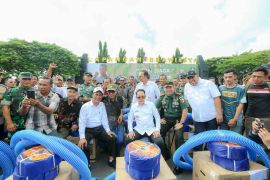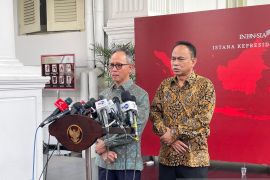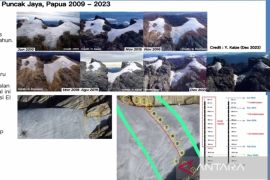"The government will not take a hasty measure, which will be perceived as an emotional step," Teguh Santosa, an international political observer at the Faculty of Socio-Political Sciences of Syarif Hidayatullah State Islamic University (UIN) Jakarta, said here on Wednesday.
Ambassador Nadjib Riphat Kesoema, who was recalled following the alleged wiretapping of President Susilo Bambang Yudhoyonos cell phone by the Australian intelligence agency, arrived in Jakarta on Tuesday.
Stating that the Ambassadors recall was an appropriate and commensurate measure and a heavy blow to the Australian government, Santosa said the acknowledgement of Australian Prime Minister Tony Abbott over the issue in the Australian Parliament constituted a commensurate punishment, although he refused to apologize for the spy row reasoning that the wiretapping was done to protect Australias national interest.
Regarding the tension that Indonesia and Australia will face in their relations, Santoso hoped that parties outside the government would not aggravate the situation, let alone exert pressure on the government to take a rash decision, such as severance of diplomatic ties, or even going to war following the wiretapping scandal against a number of Indonesian state officials.
Emphasizing that war would not be a wise measure, he said, "War is not only expensive economically, but it is also expensive politically as it can cause a head of the government or a head of the state to lose power."
A study had indicated that more governments in democratic countries have fallen after waging a war, irrespective of whether they had won or were defeated, than those in undemocratic states, Santosa elaborated.
"There is also an adage that says a democratic country will never wage a war against another democratic nation," he added.
Stating that the Indonesian government understood this matter well, he said, "Hence, it will not take a harsher measure (than recalling the Ambassador)."
Santoso expressed hope that the government would not manipulate public emotions, let alone prolong this polemic to divert public sentiment from domestic affairs that are far more important.
"We had better prioritize our national interest in the face of this issue and avoid emotional measures," he said.
An article published by The Guardian earlier on Monday stated that the Australian government, in 2009, had wiretapped the private phones of Indonesian President Susilo Bambang Yudhoyono and First Lady Ani Yudhoyono, along with several ministers and government officials.
The article was based upon documents leaked by a former employee of the United States National Security Agency (NSA), Edward Snowden, who is now living in asylum in Russia.
On Monday, President Yudhoyono had instructed Foreign Affairs Minister Marty Natalegawa to recall Indonesias Ambassador to Australia. This is a very stern diplomatic measure, he said.
He further said that the government has registered a strong protest since the disclosure of spying activities indulged in by the United States and Australia in Indonesia and other countries.
"I also regret the statement made by the Australian Prime Minister, who acknowledged the wiretapping of officials in Indonesia without a sense of guilt," the President said.
Indonesia also announced on Monday that it has recalled its Ambassador from Australia following reports that Australian spies had attempted to listen to the Presidents cell phone conversations in 2009.
"We have recalled the Ambassador to Australia in Canberra for consultation and to understand what is happening in Australia," Indonesian Foreign Affairs Minister Marty Natalegawa said at a press conference on Monday.
The minister added that Indonesia had decided to recall its Ambassador, as he would be unable to perform his tasks properly amidst the ongoing spying issues.
(A014/INE/O001)
EDITED BY INE
(A014/KR-BSR/O001)
Editor: Jafar M Sidik
Copyright © ANTARA 2013











